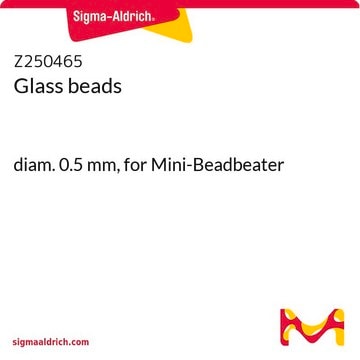18406
Glass beads
diam. ~5 mm
Sinónimos:
Glass beads, Anti-bumping granules
Iniciar sesiónpara Ver la Fijación de precios por contrato y de la organización
About This Item
Código UNSPSC:
12352103
NACRES:
NA.22
Productos recomendados
Diámetro
~5 mm
Nivel de calidad
¿Está buscando productos similares? Visita Guía de comparación de productos
Categorías relacionadas
Descripción general
Glass beads ~5 mm are made of high purity soda-lime glass.
Aplicación
Glass beads are generally added to the boiling solutions to prevent bumping. It is also used as supports to various photocatalysts to enhance the adsorption of organic pollutants in photocatalysis.
Código de clase de almacenamiento
11 - Combustible Solids
Clase de riesgo para el agua (WGK)
nwg
Punto de inflamabilidad (°F)
Not applicable
Punto de inflamabilidad (°C)
Not applicable
Equipo de protección personal
Eyeshields, Gloves, type N95 (US)
Elija entre una de las versiones más recientes:
¿Ya tiene este producto?
Encuentre la documentación para los productos que ha comprado recientemente en la Biblioteca de documentos.
Los clientes también vieron
Effect of adsorbents coated with titanium dioxide on the photocatalytic degradation of propoxur.
Lu MC, et al.
Chemosphere, 38(3), 617-627 (1999)
Lisheng Ni et al.
Nucleic acids research, 37(20), 6970-6983 (2009-09-18)
Plasmids harbored by Staphylococcus aureus are a major contributor to the spread of bacterial multi-drug resistance. Plasmid conjugation and partition are critical to the dissemination and inheritance of such plasmids. Here, we demonstrate that the ArtA protein encoded by the
Jackie K Cheung et al.
PloS one, 4(6), e5849-e5849 (2009-06-11)
Toxin production in Clostridium perfringens is controlled by the VirSR two-component signal transduction system, which comprises the VirS sensor histidine kinase and the VirR response regulator. Other studies have concentrated on the elucidation of the genes controlled by this network;
Josef Wagner et al.
PloS one, 3(10), e3578-e3578 (2008-11-01)
Molecular analysis of bacterial 16S rRNA genes has made a significant contribution to the identification and characterisation of bacterial flora in the human gut. In particular, this methodology has helped characterise bacterial families implicated in the aetiology of inflammatory bowel
Asier González et al.
Molecular and cellular biology, 29(10), 2876-2888 (2009-03-11)
Yeast ptc1 mutants are rapamycin and caffeine sensitive, suggesting a functional connection between Ptc1 and the TOR pathway that is not shared by most members of the type 2C phosphatase family. Genome-wide profiling revealed that the ptc1 mutation largely attenuates
Nuestro equipo de científicos tiene experiencia en todas las áreas de investigación: Ciencias de la vida, Ciencia de los materiales, Síntesis química, Cromatografía, Analítica y muchas otras.
Póngase en contacto con el Servicio técnico





